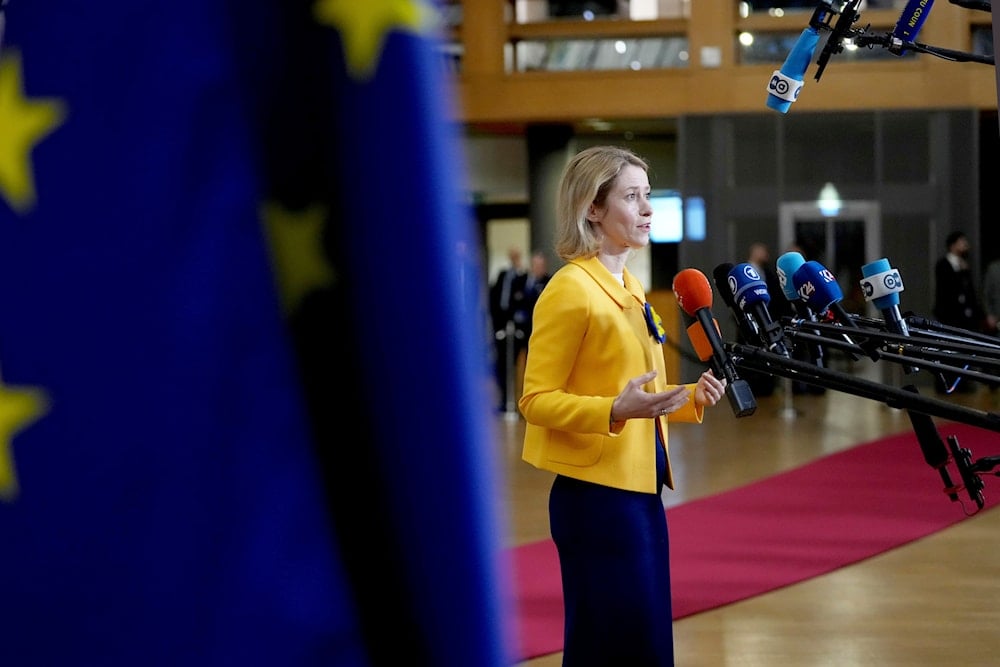EU approves 16th package of Russia sanctions
The package bans servicing oil and gas refineries but stops short of imposing a complete ban on Russian LNG.
-

European Union foreign policy chief Kaja Kallas speaks with the media as she arrives for a meeting of EU foreign ministers at the European Council building in Brussels, on February 24, 2025. (AP)
The EU Council announced on Monday that it has approved the 16th sanctions package against Russia, adding 48 individuals and 35 organizations to the list.
In a statement, the EU said, "The Council adopted today a wide-ranging 16th package of economic and individual restrictive measures...The Council agreed on a significant set of 83 listings, consisting of 48 persons and 35 entities responsible for actions undermining or threatening the territorial integrity, sovereignty, and independence of Ukraine."
The new sanctions include a ban on offering specialized financial messaging services to 13 regional banks considered vital to Russia's financial and banking systems.
The statement read, "Lastly, the EU introduced further restrictions on exports of goods which contribute to the enhancement of Russian industrial capabilities (chemicals, some plastics, and rubber) and their transit through Russia, as well as further restrictions on the import of primary aluminum, which generates significant revenues for Russia."
In addition, the EU has revoked the broadcasting licenses of eight Russian media outlets in Europe.
"Further vessels were added to the list of those subject to a port access ban and ban on provision of a broad range of services related to maritime transport...74 vessels originating from third countries were targeted today on these grounds, bringing the total of designated vessels to 153," the statement said.
EU ban on ports, airports
Furthermore, the EU has banned transactions with certain ports, locks, and airports in Russia that are used to transfer UAVs, missiles, and related technology, or for bypassing the Oil Price Cap and other restrictive measures through risky shipping practices.
This includes two Moscow airports (Vnukovo and Zhukovsky), four regional airports, Astrakhan Port and Makhachkala Port on the Caspian Sea. The seaports of Ust-Luga and Primorsk on the Baltic Sea, and Novorossiysk on the Black Sea, are also covered.
The statement said, "The Council also added 53 new entities to the list of those directly supporting Russia’s military and industrial complex in its war of aggression against Ukraine. They will be subject to tighter export restrictions concerning dual-use goods and technologies, as well as goods and technology which might contribute to the technological enhancement of Russia’s defense and security sector," adding that the list includes firms from China, India, Kazakhstan, Singapore Turkey, the UAE, and Uzbekistan.
The EU is tightening road transport restrictions within its territory, prohibiting EU operators with 25% or more Russian ownership from transporting goods, including in transit. The new rule also blocks any changes in ownership that would increase Russian stakes above this threshold.
Trade restrictions to Belarus
The latest sanctions package also extends trade restrictions to Belarus, aligning them with those imposed on Russia. It includes measures on services, software, deposits, crypto-asset wallets, and transport. Additionally, the EU Council introduced a new listing criterion targeting individuals and entities connected to Belarus's military-industrial complex.
The decision also broadens the list of restricted items that aid Russia's defense and security sector.
The updated sanctions now cover materials and technologies essential for developing and producing Russian military systems, including chemical precursors for making chloropicrin and other riot-control agents, software for computer numerical control (CNC) machines, chromium compounds, and video game controllers that could be used to operate drones.

 3 Min Read
3 Min Read










